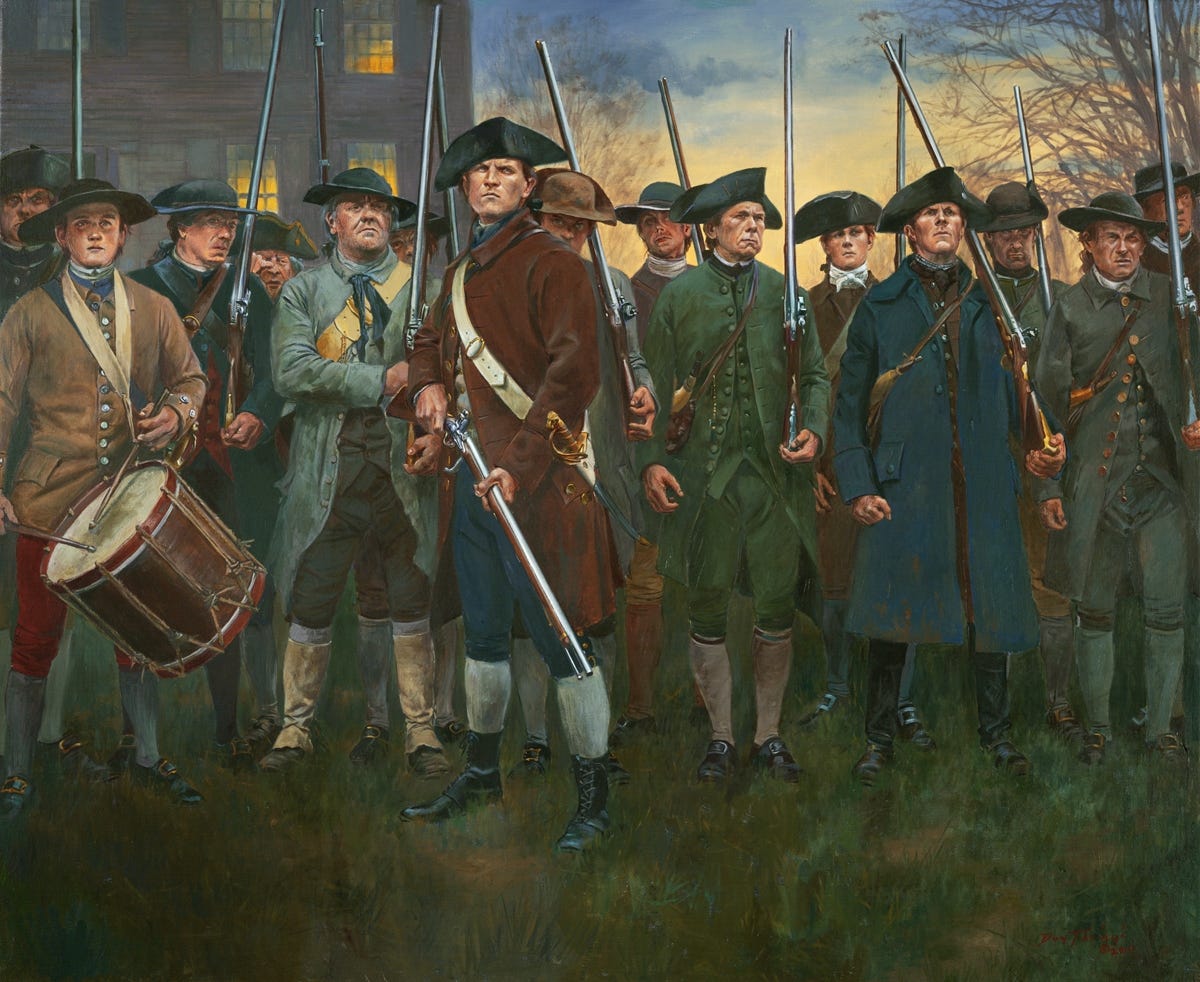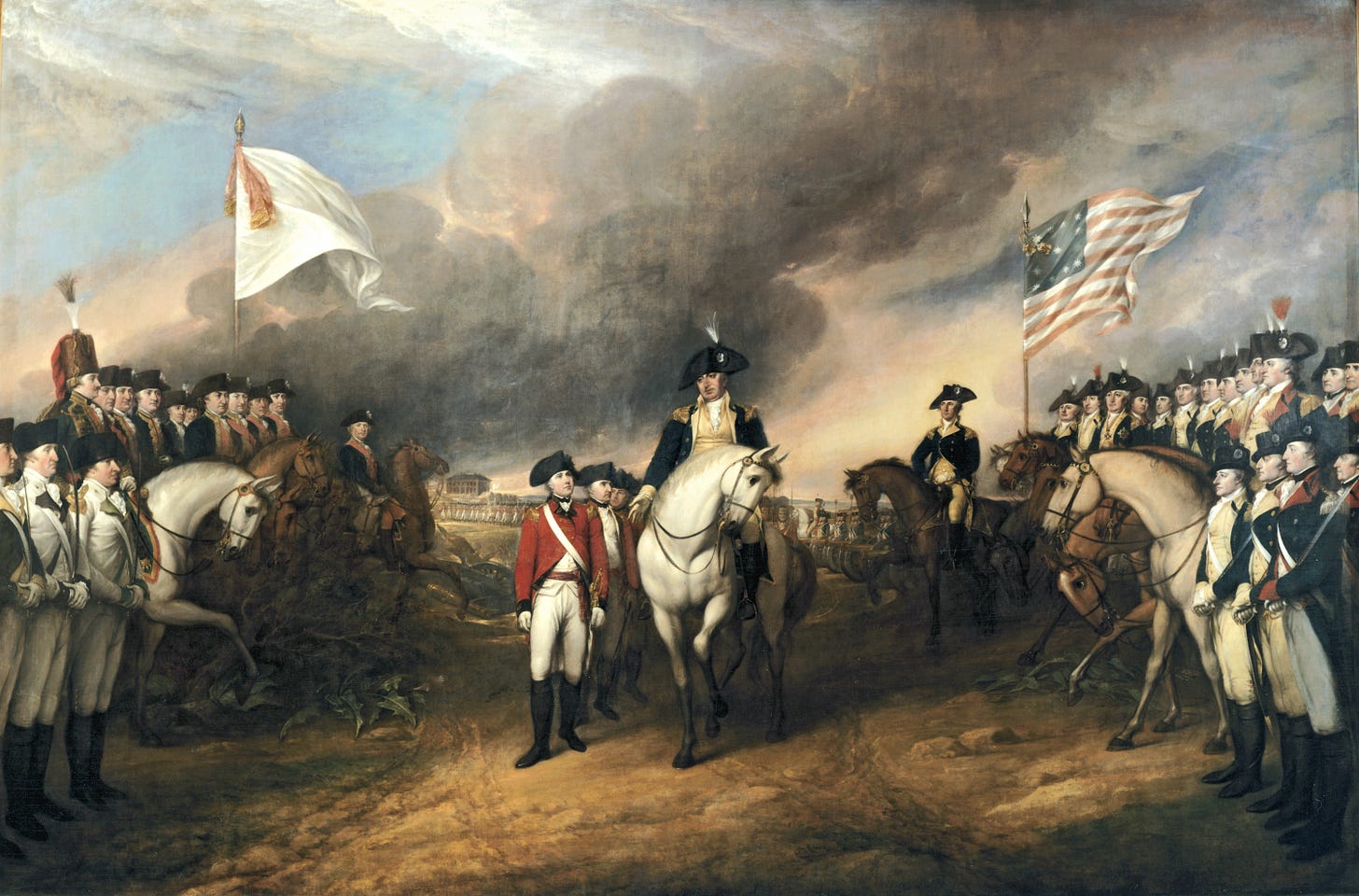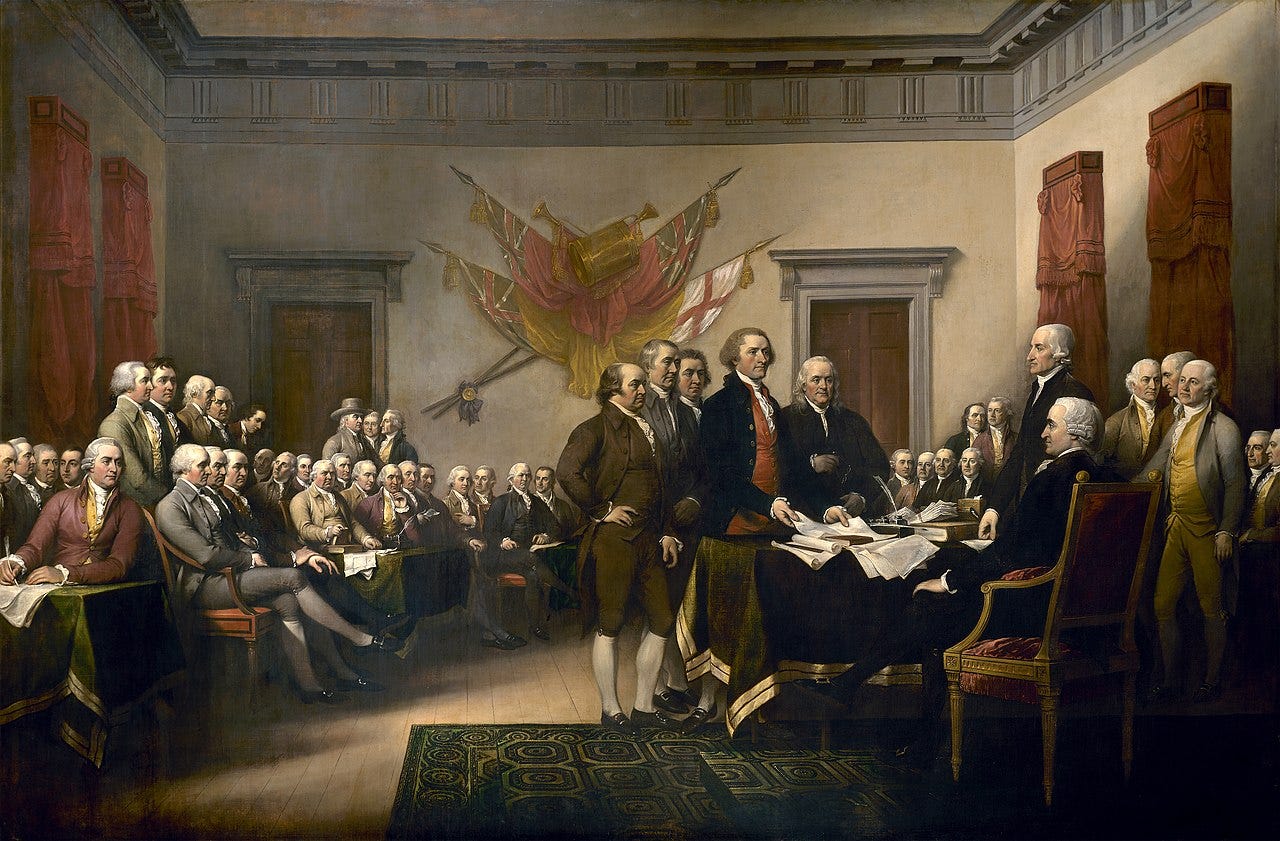This post is now unlocked for free subscribers. Thank you for your support!
On October 19, 1781, exactly 242 years ago, British General Lord Charles Cornwallis surrendered his army to General George Washington in Yorktown, Virginia. Though the American War for Independence would not technically end for another two years with the signing of the Treaty of Paris, the surrender at Yorktown marked the end of major combat operations. The Americans, with help from the French Navy, had accomplished the unthinkable: they had defeated Great Britain on the field of battle and won their independence.
Such a victory seemed so unlikely just six years prior. On the night of April 18, 1775, regulars of the British Army set out from their base in Boston to seize a cache of illegal weapons in nearby Concord. This was not the first time this had happened. Tensions had been rising for years between colonists and the British government in the Massachusetts Bay Colony. Every protest against British taxes and regulations by the men of Boston had been met by heavy-handed responses from British officials. It was in Boston in 1770 that British soldiers shot and killed several colonists after being accosted by an angry mob. It was in Boston in 1773 that colonists dumped tea into the harbor to protest excessive taxation. Finally, Parliament had enough, and placed Boston under martial law. Colonists were prohibited from assembling, soldiers were quartered in private homes, and anyone accused of a crime would be taken to London for justice rather than tried before a jury of their peers. General Thomas Gage, recently appointed military governor of the Massachusetts Bay Colony, worried that the weapons stored in Concord would soon be used against his men. (He was probably right.)
The colonists were organized and ready. Members of the Sons of Liberty – the Proud Boys of their day – had informants in the governor’s household and learned of the imminent confiscation. Men including Paul Revere and William Dawes rode through the night, calling on the Massachusetts militia to assemble. As the sun rose on the morning of April 19, a few dozen men from Lexington stood on the parade ground in the center of town. Captain John Parker of Lexington had made a show of standing in the way of British columns in the past, but perhaps he had a feeling that this morning would be different. He told his men, “Stand your ground; don't fire unless fired upon, but if they mean to have a war, let it begin here.”

Major John Pitcairn of the British Army was leading a small detachment through Lexington when he came upon Parker’s militia. He intended to carry out his orders without bloodshed, and so ordered the assembled militia to disperse. They refused. Someone – historians are not sure who – fired a shot, and the battle was joined. In reality it was little more than a short skirmish in which eight colonists were killed. The British continued their march, but by this time the militia had assembled and managed to stop them at Concord. The militia chased the regulars back to Boston and surrounded the city, beginning a siege that would last for the next year. General Gage made one major attempt to disperse the besieging militia, but his victory at Bunker Hill in June of 1775 was a Pyrrhic one which demonstrated the willingness and ability of the colonists to fight.
Nobody knew at the time that the shots fired at Lexington would go down in history as the start of the American Revolution and the birth of the United States of America as a nation. This was only visible in hindsight. The men of the Massachusetts militia who took a stand at Lexington, Concord, and Bunker Hill were not fighting to secure independence for something called the USA, rather they were simply taking back their natural rights as freeborn Englishmen, rights that the British crown had usurped. After all, taking up arms to secure liberty was an English tradition. In 1215, English nobles fought against King John and forced him to sign Magna Carta, a landmark document which guaranteed the rights of freeborn Englishmen and constrained the King’s ability to restrict them. In the 1640s, Englishmen again fought against their King, accusing Charles I of ruling without parliamentary authority. Finally, in 1689 the English people ousted the Catholic King James II in favor of his nephew, the Protestant William of Orange. This “Glorious Revolution” as they called it also occasioned the creation of an English Bill of Rights that further guaranteed liberty to the people. The Massachusetts colonists were not doing anything extraordinary in 1775, but were walking in the footsteps of English patriots going back more than five hundred years.
Even after the Continental Congress sent George Washington to Boston to turn the militia into a regular army, their goal remained reconciliation with Great Britain. Independence was not openly discussed at this point. King George III, however, was not interested in reconciliation. When news reached him of the Battle of Bunker Hill, he and his ministers drafted a Proclamation of Rebellion. The King declared that the colonists were in a state of open rebellion against the crown and Parliament, and he authorized his military leaders to do whatever was necessary to suppress them. Despite hopes for reunification with Britain by moderate delegates such as Pennsylvania’s John Dickinson, the King’s proclamation left the Congress with little choice but to pursue independence. The alternative, at this point, was to be executed as traitors. “We must all hang together,” said Benjamin Franklin, “or we will all hang separately.”
Despite what our leaders say today about violent protests having “no place” in America, our country was born in violence. The American Revolution was a civil war, in a sense, in that Englishmen fought other Englishmen, and colonists fought their own neighbors. Many colonists remained loyal to the British Crown and were dismayed to see their neighbors turn traitor against King and Country. Some of these Tories, as they were called, even took up arms to fight against the patriots. Both sides committed what we would consider to be atrocities during the course of the war. Once independence was secured, those who had sided with the British were forced out of their homes, many settling in Canada. Had the outcome been different, it would have been the patriots who would have lost their homes and been forced into exile. The aftermath of war is never neat and tidy. War truly is Hell, but it is often necessary.
The delegates who debated independence in Philadelphia in 1776 had a sense of the weight of history. When the Continental Congress asked Thomas Jefferson to compose a draft for the Declaration of Independence, he did not merely write a simple document explaining why the Colonies were separating from Great Britain. Instead, he wrote an entire treatise on the subjects of liberty and natural law that drew from the philosophical ideas of Montesquieu, Locke, Hobbes, and many other wise men.
We tend to look back on our Founding Fathers as gods among men, statesmen who were larger than life, but they were just men, no different than you nor I. The delegates of the Continental Congress were intelligent, well read, and very wise, but at the same time they were still human beings, governed by passions and tempers, subject to the same temptations toward vanity, sloth, and envy as we are today. The Declaration of Independence was not the holy word of God carved on stone tablets and handed down from heaven, but the opinions of fallible men about the nature of government. The fact that it has been an inspiration for two hundred and fifty years, not only to Americans but to many freedom-loving people throughout the world, is a testament to those men, and to the God who guided them.
Hindsight can make us forget that there was no guarantee of victory for the patriots of 1776. Indeed, any objective observer would have been foolish to bet on the Continental Army achieving victory over the mighty British empire. In the century leading up to the American War for Independence, Britain had beaten the Jacobite rebels three times, twice defeated the French in conflicts ranging from Europe to India to North America, and had established themselves as the preeminent world power on land and sea. The colonists, despite being of British descent themselves, were considered to be low class, incapable of the discipline and strategy necessary to compete in the big leagues of war. Nevertheless, the colonists took their stand. They considered liberty a cause worth fighting and dying for, even if it seemed hopeless.
What cause do we consider worth fighting and dying for, even when it seems hopeless? The biggest problem we face today is inertia. We tend to take things for granted, both the prosperity that our nation has enjoyed since the 1940s as well as the restrictions on our liberties that have been growing for even longer. Like caged animals, we have become accustomed to domestication. News media keeps us in a state of passive confusion, while pervasive (and perverse) entertainment keeps us in spiritual lethargy. If the patriots who fought in the Revolution had woken up one day to find that their government was censoring the mail, blacklisting people from buying or selling based on their political views, and confiscating half their income, they would have launched an armed rebellion before breakfast.
But our freedoms were not taken away overnight. They were chipped away, little by little, over the course of many decades. Nevertheless, the top priority of self-identified conservatives for the past century has been to defend the gains made by yesterday’s progressives. Republicans defended the New Deal and Social Security in the 1960s. In the 1980s, President Ronald Reagan lacked ability to roll back the welfare state of the Great Society. Throughout the 2010s, self-appointed leaders of the conservative movement were defending gay marriage, endless war, and even Obamacare. The idea of rolling back the latest progressive gain never seems to occur to our side, much less taking decisive action to reclaim our country. “This is not the hill to die on,” they always say. What hill are they willing to die on? For many conservative leaders, that hill never comes. Thank goodness that the Massachusetts militia was willing to die on Bunker Hill in 1775, or the American Revolution would never have gotten off the ground.
In a letter to his wife Abigail in 1777, John Adams wrote, “Posterity! You will never know, how much it cost the present Generation, to preserve your Freedom! I hope you will make a good Use of it. If you do not, I shall repent in Heaven, that I ever took half the Pains to preserve it.” I fear that Adams would be disappointed if he knew how lightly we take the freedoms that his generation fought so hard to protect.
Thomas Jefferson believed that every generation would have to fight their own revolution to maintain their freedoms. “The tree of liberty must be refreshed, from time to time, with the blood of patriots and tyrants.” Without such revolution, a governing class develops that is removed from the people at large. Tyranny inevitably develops when elected officials no longer fear their citizens.
This week, pro-Hamas demonstrators occupied the Capitol and a congressional office building. They were warmly greeted by pro-Hamas Congresswoman Rashida Tlaib. While several were arrested, they will no doubt have charges quietly dropped while the entire incident will have been forgotten by Saturday. Compare that to the unauthorized tour of the Capitol by the January 6th protestors two and a half years ago, whose participants continue to be persecuted by a vengeful government. Which group of people do you think our elected representatives most feared — the regime-approved leftist foot soldiers, or the angry conservatives who suddenly went off script?
I’m not saying it’s time to take up arms, or even to protest in the streets. Our battlefield is rhetorical, political, and legal, but victory is no less imperative. We need bold leaders who are willing to draw the ire of the news media, who will keep fighting even when attacked from all sides, who are willing to see former friends stab them in the back. We need zealous soldiers who will knock on doors, show up to committee hearings, and donate money to the cause. We are at a revolutionary moment in history, no less than the one our Founders confronted in 1776.
The men of Massachusetts who took up arms to fight for their rights recognized their place in history. When word of the signing of the Declaration of Independence reached George Washington’s Continental Army in the summer of 1776, the young and brilliant tactician Henry Knox said, “The eyes of all America are upon us. As we play our part posterity will bless or curse us.” Though the words of the Declaration have ascended to the level of holy scripture in American consciousness, without military victory it was merely a piece of paper. We remember the words of statesmen such as Thomas Jefferson, John Adams, and James Madison, but it was the soldiers, from George Washington to the lowest private, who made American independence a reality. Like those brave soldiers, history might not remember our names but it is no less important that we work together to save our country. I pray that posterity well bless us for the actions we take in the upcoming days, months, and years.
As I speak right now, seventy-five million Americans are waiting for someone to lead them into battle to reclaim their liberties. Here in Idaho, hundreds of thousands of good conservatives are unsure of where to turn. To quote Barack Obama, “we are the ones we have been waiting for.” A new generation is rising in America. The political leaders who have been running our country for more than thirty years are passing away. President Trump is in his seventies, Joe Biden is nearly eighty, and the most powerful men and women of both parties are even older. Democratic Senator Dianne Feinstein held on to power until the moment she died, and at the end was literally wheeled around the Capitol by staffers who told her how to vote.
Their time is nearly over. Our time is just beginning.
Consider the ages of our founders. George Washington and John Adams were in their forties in 1776, while Thomas Jefferson was thirty-three. The brilliant Henry Knox was twenty-six, and Alexander Hamilton was only twenty-one. While some of these men had previous political experience in the colonies, many of them first made their names in the Revolution itself.
Where are the founding fathers of our new nation? Somewhere out there right now is a Henry Knox, with a talent for tactics despite no previous experience in war. Somewhere out there is an Alexander Hamilton, with innovative ideas on how to organize and finance a new government. Somewhere out there is a Thomas Jefferson, whose writings will serve as the philosophical foundation for a new nation. Somewhere out there is a George Washington, who will rise to the occasion to lead men in both war and peace.
Revolution is in our blood, and our nation sits on the knife-edge of history. As Ronald Reagan said in 1964, we will either step up to defend our God-given liberties today, or face a thousand years of darkness. What will you do? Will you run away, flee to the country, in hopes that you can avoid the risks associated with taking a stand? Will you be a Tory, still loyal to the old, broken, America, willing to fight your neighbors to maintain it? Or will you be a patriot, risking everything to reclaim your rights and create a new nation for your posterity?
I pray that patriots in Idaho will be found faithful by those who come after us.







Brian Almon: Someday *your* name will be remembered as one of the great essayists of our time. Your ability to juxtapose the past with the present and the future is uncanny.
Everyone should listen to Brian’s exceptional retelling of history. Everyone should get off the couch, stop playing video games or hiding their heads in the sand, and get to work saving our Republic.
Do not look to most of our current entrenched officials for help; you will be sorely disappointed. Idaho Congressman Mike Simpson and nearly two dozen other “Republicans” proved that with their votes against Jim Jordan as House Speaker this week. These wimpy elected officials are just the latest examples of why *we the people* must wake up NOW before *we the people* are put to sleep permanently.
A well-informed citizenry is as important as a well-armed citenry. If you share Brian’s articles and subscribe to his Substack and others of similar quality on many topics, you’ll be doing a lot.
But you can do much more! Talk to your neighbors and elected officials in person (even in parking lots and school hallways). Make phone calls. Write letters to the Editor. Comment on Substacks. Share information that doesn’t come from mainstream media and social media.
Whatever you do, avoid Googling something and believing the “oh, that’s a right-wing conspiracy theory” assertions in the first page of links. That’s what lazy mainstream and social media journalists do. Instead, ask where those assertions are coming from and who benefits.
Think independently. Look deeper. Read widely. Avoid rushing to judgement after reading breaking news, which often is inaccurate, misleading, or meant to induce fear and outrage. Work together. Our country IS worth saving.